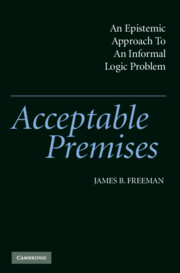Book contents
- Frontmatter
- Contents
- Preface
- Acknowledgments
- PART 1 ACCEPTABILITY: DIALECTICAL AND EPISTEMOLOGICAL COSIDERATIONS
- 1 Why Do We Need a Theory of Acceptability?
- 2 Acceptability and Presumption
- 3 Factors Determining Presumption: Basic Considerations
- 4 Epistemological Considerations: Acceptability, Deontology, Internalism, Justification
- PART 2 STATEMENTS, BELIEF-GENERATING MECHANISMS, AND PRESUMPTIVE RELIABILITY
- PART 3 PRACTICE AND PERSPECTIVE
- Notes
- References
- Index
2 - Acceptability and Presumption
Published online by Cambridge University Press: 02 December 2009
- Frontmatter
- Contents
- Preface
- Acknowledgments
- PART 1 ACCEPTABILITY: DIALECTICAL AND EPISTEMOLOGICAL COSIDERATIONS
- 1 Why Do We Need a Theory of Acceptability?
- 2 Acceptability and Presumption
- 3 Factors Determining Presumption: Basic Considerations
- 4 Epistemological Considerations: Acceptability, Deontology, Internalism, Justification
- PART 2 STATEMENTS, BELIEF-GENERATING MECHANISMS, AND PRESUMPTIVE RELIABILITY
- PART 3 PRACTICE AND PERSPECTIVE
- Notes
- References
- Index
Summary
At the end of the chapter, we framed the following proposal:
A statement is acceptable just when there is a presumption in its favor.
This proposal practically follows analytically from Cohen's characterization of a presumption as what we may take for granted absent reasons against doing so (1992, p. 4). But it holds out much further promise for clarifying just what acceptability means and how we may determine when statements are acceptable. The concept of presumption is used in various disciplines. Aspects of its various uses and various ways of determining presumption may guide us in constructing a concept of epistemic presumption suitable for explicating acceptability. To develop this proposal, we first look at just how the concept of presumption is treated in various contexts.
USES OF “PRESUMPTION”
“Presumption” is first of all a jurisprudential notion. A courtroom proceeding is typically a debate between two opposing sides before an adjudicative panel. Presumption and its cognate notion “burden of proof” are ways of determining which adversary must argue what before this tribunal. If there is a presumption in favor of the innocence of the accused, then the burden is on the prosecution to argue for the guilt of that person. At least initially, the defense need not argue for innocence. The adjudicative panel is enjoined to accept that claim (i.e., to “take it for granted”) until and unless the prosecution successfully establishes guilt.
- Type
- Chapter
- Information
- Acceptable PremisesAn Epistemic Approach to an Informal Logic Problem, pp. 21 - 37Publisher: Cambridge University PressPrint publication year: 2004



